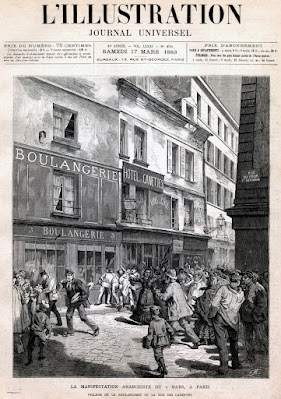Anybody who stands up to state repression or struggles for justice, knows full well that the state apparatus will use whatever force is needed to try and subdue the protestors. The state needs control of the population to safeguard its power, wealth and privileges. The people living on that plot of land called Ecuador are at present feeling the wrath of a frightened state institution as its brutality intensifies in a desperate battle to gain control of the population. Despite this force the people continue their struggle for justice and freedom.
An extract from an article on
Crimethinc:

--------On October 8, thousands of indigenous people occupied the Parliament building in Quito. Can you describe for us what happened there?
In fact, the Indians arrived on October 7, on Monday, and there was a pitched battle in Quito that lasted five or six hours involving students, social movements, and other residents of Quito who were trying to keep the police busy in order to enable the indigenous comrades to enter. Recall that we are living in a State of Exception, so the military is on the streets and had blocked Quito’s main entrances, the North and South entrances, to prevent indigenous people from other provinces from entering. However, the people were so well-organized that the military did not have enough intelligence at their disposal to stop them. The fact that the fight took place in the city center also opened up gaps that enabled the indigenous people to reach the historic center.
Just as we pushed the police back, we saw the crowded trucks coming and the bikes that accompanied the indigenous caravan. It was a very exciting moment.
They went directly to El Arbolito Park, next to the Salesian University, where logistical support for the movement is organized. The following day, a rally took place at Parque El Arbolito and people agreed to take the Assembly (the parliament building in Quito). When we arrived there, a first delegation entered, then gradually more and more people entered, while there were thousands of people at the door of the Assembly wanting to enter. Police shot tear gas canisters at people, which created a mass panic. People could have been trampled to death because many could not breathe; people ran in various directions. Meanwhile, police continued to fire tear gas canisters and rubber bullets at protesters. At that moment, a very great repression began.
The Assembly, strategically speaking, is like a small fort perched on a hill; to protect it, the police positioned themselves at a higher point so that snipers could hit the protesters with tear gas canisters and also live rounds. As a result, the police inflicted a large number of injuries and some deaths, as they were in a strategic position.
The idea of going to the Assembly was one of the actions that the indigenous movement had decided to carry out during these days in Quito. Until yesterday [Wednesday, October 9], there was a lot of concern because there was no clear strategy, while the government refused to back down and kept increasing the repression. The fact that police sent tear gas into shelters and peace encalves such as the Salesian University and the Catholic University caused a great deal of outrage; in a way, this was a blow to the government, because the news circulated despite the news shutdown that the mainstream media and the government have been trying to maintain.
Today [Thursday, October 10], in the morning, eight police officers were captured by the movement and brought to the large popular and indigenous assembly at the House of Culture, where there were about 10,000 or 15,000 people. The reporters who were there ended up broadcasting the assembly live, even if they didn’t do it in the best way. In a way, this broke the media siege by disclosing, for example, the fact that an indigenous leader of Cotopaxi, Inocencio Tucumbi, had been killed. He had lost consciousness after inhaling a lot of tear gas and was then trampled by a police horse. That had not appeared in the mainstream media. Suddenly, the dead appeared on the big television channels and it became clear to the general public that—yes, the government is killing people and carrying out repression at an extreme level!--------
Read the full article HERE:
Visit ann arky's home at
https://radicalglasgow.me.uk















































